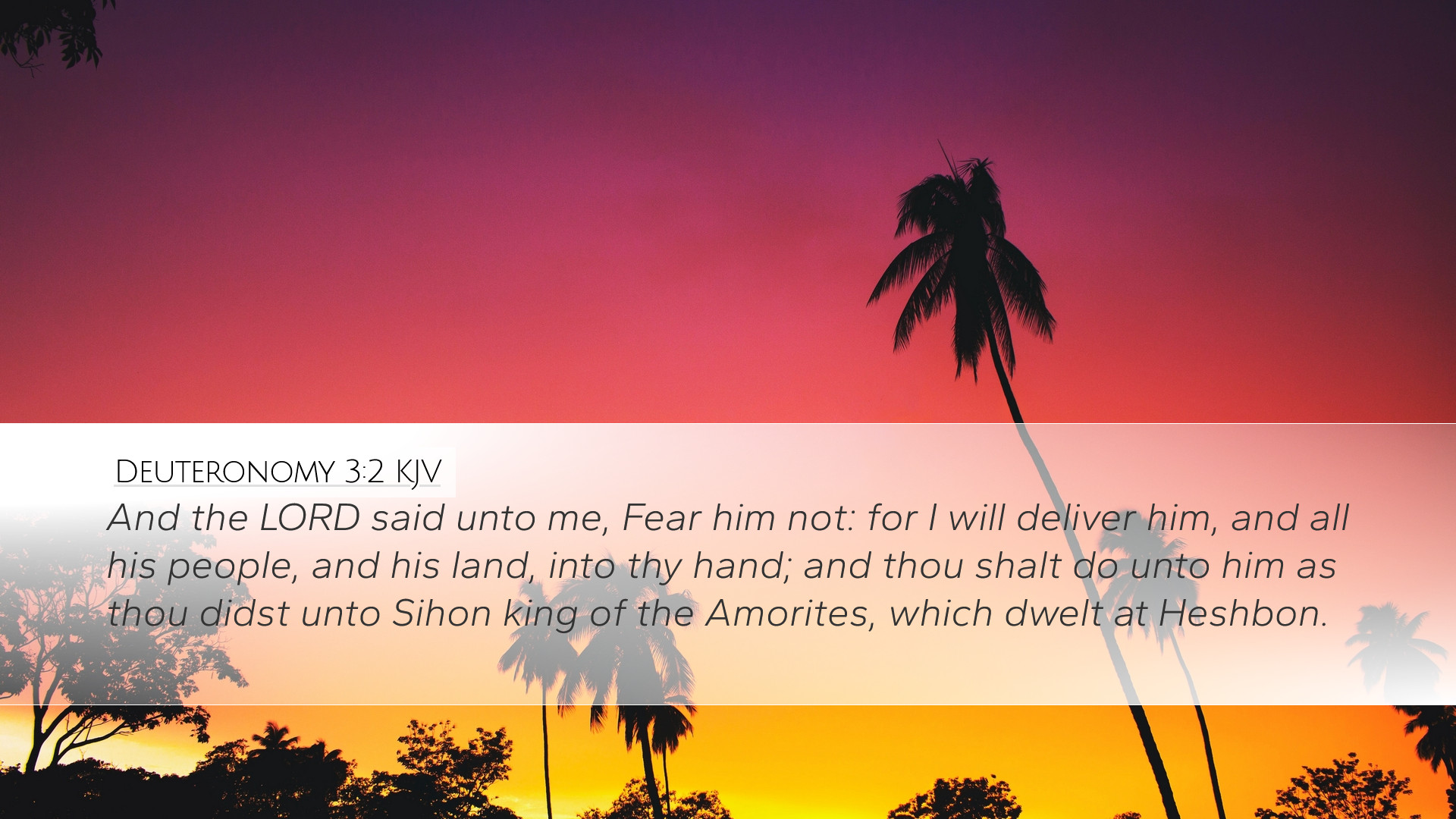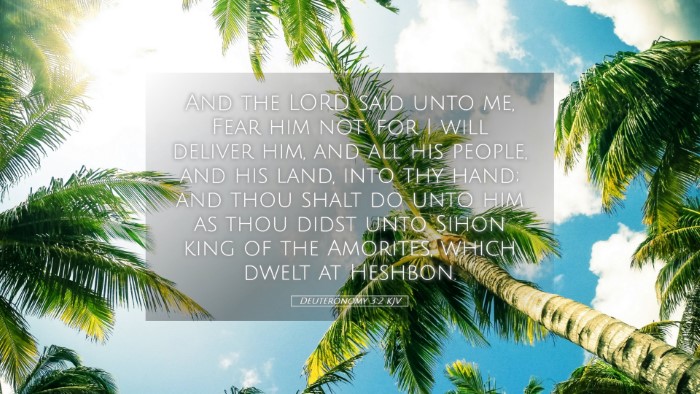Commentary on Deuteronomy 3:2
Verse: "And the LORD said unto me, Fear him not: for I will deliver him, and all his people, and his land, into thy hand; and thou shalt do unto him as thou didst unto Sihon king of the Amorites, which dwelt at Heshbon."
Introduction
The Book of Deuteronomy serves as a retrospective glance at the journey of the Israelites through the wilderness and preparation for conquest in the Promised Land. Chapter 3 details the encounters of Israel with significant adversaries, particularly Og, the king of Bashan. Deuteronomy 3:2 encapsulates a crucial moment of divine reassurance and prophetic directive, emphasizing God's sovereignty over Israel's enemies and the faithful execution of His commands by Moses.
Exegesis of the Text
Divine Assurance
In this verse, we see God speaking directly to Moses. The phrase "Fear him not" signifies God’s reassurance amidst apprehension faced by Moses regarding the formidable opposition presented by Og. Both Matthew Henry and Albert Barnes note that this fearlessness is a recurring theme in God's promises, where He repeatedly encourages His leaders not to succumb to the terror of their foes.
God’s Sovereignty and Power
“For I will deliver him, and all his people, and his land, into thy hand” highlights the assurance of divine intervention and victory promised to Moses. Adam Clarke emphasizes this point, remarking that God's promise is not contingent upon the strength of the Israelites but upon His power and faithfulness. This serves as a powerful reminder that victories do not depend solely on human capabilities but are grounded in divine providence.
Historical Context
The mention of Og, king of Bashan, situates the narrative within the historical context of Israel’s conquests. Og is described as one of the last of the giants, and his formidable stature signifies the daunting challenges Israel faces. However, the implementation of divine promise speaks volumes about how God equips His people to overcome oppressors. Barnes elaborates on this by discussing the significance of past victories, such as over Sihon, as testimonies of God’s unrelenting support for His people.
Theological Insights
The Nature of God
This verse illuminates several characteristics of God. First, His willingness to engage directly with His people reflects His personal involvement in human affairs. Second, His commitment to deliver Israel showcases His faithfulness and mercy. Henry notes that God’s delivery is a manifestation of His grace, unearned and abundant, a theme pervasive throughout the Biblical narrative.
Divine Instructions and Obedience
Among the main themes is the call to obedience. “Thou shalt do unto him as thou didst unto Sihon” not only sets a precedent for action but also reminds Moses and ultimately the Israelites that their responsibilities include executing divine judgment decisively upon those who oppose God’s purposes. Clarke asserts that this obedience is critical in asserting God’s authority on Earth through His designated leaders.
Pastoral Applications
For pastors and church leaders, this verse serves as a source of inspiration for facing challenges in ministry. Just as Moses was reassured of victory against Og, church leaders can be reminded of God's promise to stand with them against spiritual battles. Here are several key points for pastoral reflection:
- Faith Over Fear: Just as God commanded Moses not to fear, leaders today are encouraged to trust in God’s plans, despite the overwhelming odds.
- Recognizing God’s Power: Understanding that victories in ministry come through God’s might encourages reliance on prayer and divine wisdom rather than personal strength.
- Following God’s Directives: Like Moses, leaders are called to obey God’s instructions, which may sometimes require difficult actions against opposition.
Scholarly Reflections
Theological scholars observe that Deuteronomy 3:2 is a pivotal verse in understanding the conflict dynamics of Israel's conquest and its implications for biblical theology. The interplay of fear, divine assurance, and obedience reflects broader biblical themes that resonate throughout both the Old and New Testaments. Such narrative devices serve to portray that spiritual authority stems from divine revelation and promises fulfilled. The reassurances provided to Moses serve as a prophetic model for believers who strive to uphold God's will amid cultural and societal challenges.
Conclusion
Deuteronomy 3:2 is rich with meaning and offers profound insights into God’s relationship with His people. Through careful examination of public domain commentaries, one can discern that the essence of this verse lies in the unwavering promise of divine deliverance and the call for faithful obedience in the face of adversity. As spiritual leaders and scholars dissect these themes, they find both historical context and theological implications that inspire and guide them in their spiritual journeys.


